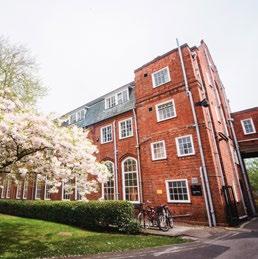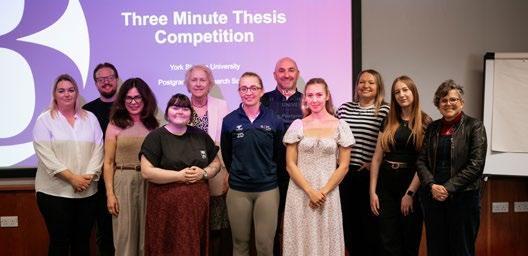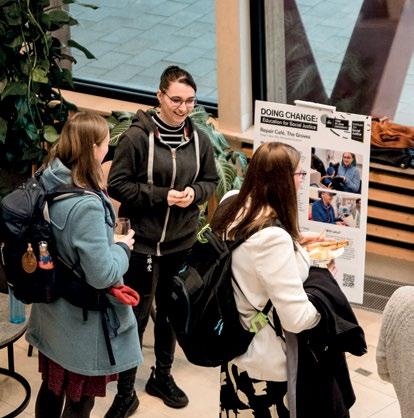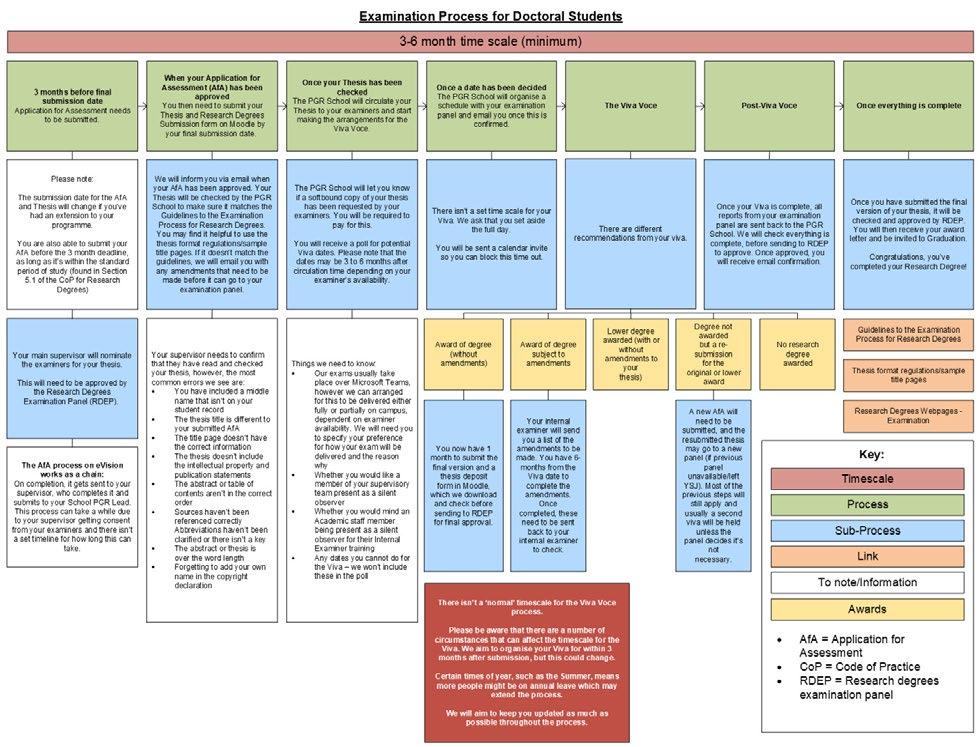Postgraduate Research School


Postgraduate Research School

2025-26
York St John University (YSJU) aims to provide you with a supportive and enriching postgraduate community.

Our Research Degrees offer training, professional development and further prospects for you as a Postgraduate Researcher (PGR). YSJU encourages you to participate in a range of activities, forums and opportunities within your School and across the University, underpinning YSJU’s Mission, Values and Vision. YSJU actively promotes an interdisciplinary approach across all five Schools and is proud to adopt this practice within the PGR community.
This handbook is intended to be used as an online resource as links and information will be updated in line with updates from guidance across the University. Additionally, the full document will be updated annually to accommodate any changes within policy or procedure for each academic year.
Professor Andrew Hill
Associate
Pro Vice Chancellor - Research
We are committed to helping our postgraduate researchers to become future research leaders, producing impactful researcher that benefits society.
To find out more about our plan to grow and support postgraduate researchers, download Our Commitment to Postgraduate Research.

As part of our commitment to postgraduate research at YSJ, we launched the Postgraduate Research School in October 2024. Alongside being a member of your academic school, on starting as a PGR at YSJ, you automatically become a valued member of the PGR School.
The Postgraduate Research School offers comprehensive support and direction to postgraduate researchers from the start to the completion of their research degree. This includes:
• A dedicated research skills training programme
• Admission support for domestic or international students
• Scholarships and funding support and advice for PGRs and PGR supervisors
• Events and opportunities to come together with others on their postgraduate research journey
• Training and guidance for postgraduate research supervisors
• Flexible work space in our Graduate Centre on campus
Launched in July 2025, the Student Hub is a simplified way for students to access help and information. The Student Hub provides a single point of contact and source of information for student support services across York St John University. Informed by colleagues who provide frontline support, the Student Hub delivers a rapid response triage service.

Through the Student Hub you can access self-help information pages, make enquiries, and book support sessions with specialist staff.
Students are able to access the Hub via a new digital portal, by phone and in person at both our York and London campuses.
Search our library of help pages
Our online Student Hub portal includes a searchable library of help pages. These cover support topics from all of our student services and are a great place to start when you are looking for information.
Search Student Hub
Ask for help
If you need help and can’t find answers in our Student Hub portal, you can make an enquiry online, in person or by phone.
Our HELP (Here to Empower, Listen and Provide) team will be your first point of contact for any questions or support requests you have. The team is made up of staff from across our support services. They will also be able to pass your query on to specialist staff, giving you access to specialist support when you need it.
The HELP team are available Monday to Friday, 9.00am to 6.00pm. You can make an enquiry in person by visiting the Student Hub enquiry desk in the Holgate building (York campus) or Floor 3 (London campus). You can also speak to a member of the team by calling 01904 876 500.
You can submit an online enquiry through the Student Hub portal at any time. To submit an enquiry, you need to log in using your York St John University username and password.
Any queries about Postgraduate Research will be passed to us in the PGR School.
Submit an enquiry
Book an appointment
You can book appointments with our support teams through the Student Hub online portal.
To book an appointment, you need to log in using your York St John University username and password. Book an appointment
Virtual Graduate Centre
The Virtual Graduate Centre (VGC) is a virtual resource on SharePoint for PGRs to find information and resources for online research skills sessions, external opportunities and links to the central support available to you as a PGR.
All information relevant to PGRs can be found on the Virtual Graduate Centre, and this is where we will refer PGRs in the first instance.
Online sessions that have been recorded as part of the Researcher Development Programme will be shared here.
The Virtual Graduate Centre can be found here: Virtual Graduate Centre
Links to the VGC can also be found at the bottom of e-mails from the PGR School.

The PGR Handbook follows the key stages of the research degree and the resources you might need in order to complete.
These are:
• Getting Started as a PGR
{ Enrolment
{ Induction
• During your research degree
{ Review stages
• Completing your degree
{ Thesis submission
{ Examination
• After your degree
{ Graduation

Throughout your research degree you will have set milestones and key points to keep you heading in the right direction, which we refer to as ‘progress monitoring’. Depending on your programme and mode of study, you will have review points to check your progress throughout your degree. We refer to point of enrolment to graduation as the ‘PGR Lifecycle’.
Once you have received your acceptance letter your path will look a little like this:
Review Stages for each research degree
The biggest question we hear from new PGRs is ‘where do I start?’. This section has been designed to make starting your degree a bit easier and applies to research degrees regardless of the specific programme. The section will cover the following:
• The very first steps
• Next steps
• Additional steps for international and disabled students
• Key contacts
• The PGR Lifecycle
• What now?
Accept your offer
Our Admissions Officers will have sent you an official offer letter email. You need to respond to this email for your enrolment process to begin. This offer details your course, fees and other relevant information. Ensure you read the email carefully and raise any queries you have as soon as possible.
Enrol
The University will contact you by email prior to your start date to invite you to enrol online. Your enrolment email will contain your Student ID number and enrolment key.
The email will contain a link to a registration task on e:Vision.
Once you have enrolled, you will:
• be able to collect your Student ID card from our York campus or request that this is sent to you by post
• receive your York St John IT account
If you have any questions about your enrolment, you can email the Postgraduate Research School, or any questions about your student record can be directed to studentrecords@yorksj.ac.uk

Collect or request your ID card
You will receive an email when your Student ID Card is ready to collect. You can also request for this to be sent to you if you’re unable to come to campus.
Your student ID card will last for the duration of your study at the University.
Your student ID card:
• Identifies you as a student of York St John University.
• Acts as your University Library card which you’ll need in order to access Library resources.
• Is required for attendance monitoring, examinations, collecting payments or other official documents.
This webpage provides some guidance on what to do if you need a replacement card: Replacement ID cards
If you’re full time, register for council tax exemption
If you are undertaking a full-time programme of study you are exempt from Council Tax. This includes vacation periods.
Organise fees and funding
On approval of your programme, you will be required to pay the relevant fee for the first year of your study. The amount will be detailed in your acceptance email.
All students are presented with a list of payment options during the enrolment process at the start of each academic year. You should expect to pay fees for every year you are in attendance.
There are different ways of paying your fees, depending on whether you’re a UK or EU and International Student.
Paying your fees (UK/Home Students) https:// studenthub.yorksj.ac.uk/helppages/article/KA-01167/ en-us
Paying your fees (EU and International Students) https://studenthub.yorksj.ac.uk/helppages/article/ KA-01167/en-us
a delay in receiving your funds. If this is the case, please make sure you have some money to support you until your first instalment is paid. You can apply for a Postgraduate Doctoral Loan in any year of your course. But if you apply after your first year, you might not get the maximum amount.
Please make sure you have the correct university on your student finance application, or your funding may be delayed at the start of your course.
Visit the gov.uk website and create an online account to apply: https://www.gov.uk/doctoral-loan
Additional sources of external funding can be found through the link on our webpage here: https://www. yorksj.ac.uk/study/postgraduate/research-degrees/ funding-your-research/
If you’re on a studentship or scholarship:
The final date for enrolment is 2 weeks after the start of your course. After that date, access to online enrolment will be denied and you will need to contact the Student Records team at studentrecords@yorksj.ac.uk .
Find more information on the Website: Council Tax Exemption
If you’re self-funding:
Please follow the links for paying your fees above.
If you’re on a Doctoral Loan:
Please refer to the ‘Paying your fees’ pages linked above.
A Postgraduate Doctoral Loan can help with course fees and living costs while you study a postgraduate doctoral course, such as a PhD.
Whether you qualify depends on:
• your course
• your age
• your nationality or residency status
The government website has full information on reasons you may not qualify for a loan.
The amount you receive is dependent on what year you started your course. Please check the government website for the specific amount.
The loan is paid directly to you. You can use it for your course fees and living costs.
You get the first payment after your course start date, once our student records team confirm that you’ve registered.
The loan will be paid in 3 instalments of 33%, 33% and 34% each year. After your application has been approved, you’ll be sent a letter with your payment dates or you can check them in your online account.
If you have not applied for student finance yet, it’s important that you apply as soon as possible. It’s not too late to apply, but doing so now will likely cause
You will likely have already been in contact with our PGR Admissions officers, and our PGR Officer for Scholarships and Funding, Victoria. If you haven’t, it’s recommended that you contact them as soon as possible to understand how your contract will work.
Set up your IT account
You will have a valid York St John IT account after you have completed registration. You can register before you arrive: Welcome Guide
Your email address will be in the form firstname. lastname@yorksj.ac.uk.
The first time you log in when off campus you may have to set up multi-factor authentication to secure your account using your mobile phone. For more information visit our Multi-factor authentication page.
Watch our video guide: York St John IT logins (YouTube, 1’30”).
Your email account
Online access to email lets you read your York St John email and use other Microsoft 365 services. Your login for this is your email address.
Your email address and York St John password will also let you access other Microsoft 365 services. Use the menu in the top left to access these. You can also use your email address to log in to services using a Microsoft login. This includes Moodle, Microsoft 365 and Eduroam WiFi.
Other logins not displaying a Microsoft login will require just your username in the form firstname.
We strongly recommend these steps for you to succeed in your degree.
On, or soon after, the first day of attendance, each PGR receives a full and comprehensive induction to York St John University. Induction arrangements are co-ordinated by the Postgraduate Research School.
The PGR Induction takes place on our Lord Mayor’s Walk campus in York on the first Monday and Tuesday of October, February and June in line with the 1 October, 1 February and 1 June start dates. All October, February and June intakes will be sent the Induction Programme prior to starting their course with all the relevant details on timings and where the Induction will take place. We aim to have in person and online options for all inductions, for those who wish to come to campus/are able to, and those who cannot come to campus. For those who are unable to attend induction, the online induction will be recorded and made available via the Virtual Graduate Centre (more information on this can be found on page 5 under ‘Communications’.)
At the Induction, you will find out what it is like to be a PGR at York St John, and discover the support available to you from our professional services teams.

During the admissions process, you will have been assigned a supervisor or supervisory team. Your supervisory team’s aim is to support you through to the successful completion of your programme. Your supervisory team comprises a main supervisor and one or more co-supervisors who meet YSJ’s supervisor eligibility criteria. Your supervisors will normally be members of academic staff at the University.
We strongly recommend contacting your supervisor (if they have not already contacted you) as soon as you enrol, to arrange a meeting to have a chat about expectations, training, and discuss preliminary plans for your research.
Throughout each year you should have a minimum of 10 contact points if you are full-time PGR or 6 contact points if you are a part-time PGR. These supervisory meetings can be conducted face-to-face or via Microsoft Teams if you are not able to attend in person.
Your regular supervision meetings should be held no less than 8 weeks apart for full-time PGRs and 12 weeks apart for part-time PGRs.
There is a section on your eVision profile to complete a supervisor meeting log.
Understand the expectations for your research
Full-time PGRs are expected to work on their research project (and related professional activity e.g. conference attendance, research skills training) for periods of time that are comparable to a full-time academic post (the equivalent of an average of 40 hours a week).
Part time PGRs are expected to work on their research project for the equivalent of an average of 20 hours per week.
Please do note that every PGR and every research degree is different, and you may work more or less than this. It’s important to discuss expectations in your first supervisory meeting to understand what will work best for you.
PGRs are encouraged to maintain a good work/life balance and may take up to 25 days holiday a year (in addition to days when the University is officially closed) in consultation with their supervisory team.
Familiarise yourself with policies, specifically the Code of Practice for Research Degrees
Familiarising yourself with the policies early on can mean you’re more familiar with processes later down the line.
The Code of Practice for Research Degrees is updated on an annual basis and outlines the principles, processes, general rules and conventions relating to research degrees.
The ‘Code of Practice for Research Degrees’ should be read alongside the University’s ‘Regulations for Research Degrees’ and ‘Guide to the Examination Process for Research Degrees’. YSJU ensures its arrangements for the provision of research degrees, as a minimum, meet the requirements of the UK Quality Code, Advice and Guidance: Research Degrees.
We also recommend you familiarise yourself with the Learning Outcomes for the Award of Research Degrees which can be found on the Research Degree Documentation Webpage. We recommend you bookmark this webpage so it is easy to find later.
Start thinking ahead about the training might need to do
The Postgraduate Research School offers a full programme of training and professional development sessions and events held throughout the year, called the Researcher Development Programme. The Researcher Development Programme is not a course for you to complete in its entirety. Unlike a taught degree programme, where you must complete modules and submit assignments to demonstrate your understanding of the topics you have studied, the Researcher Development Programme invites you to develop your abilities, skills, and confidence as a researcher. We encourage you to treat it as a series of starting points from which to begin planning and designing your personal and professional development.
Your first supervisory meeting should be a chance for you to identify any training that your supervisor recommends, or any training that you might want to consider. Individual sessions as part of the researcher development programme are designed to introduce you to a topic or theme and consider its potential applications to your own research, while events
such as masterclasses or professional development symposia invite you to spend more time exploring a particular issue or idea. It is then up to you, through reflection and discussion with your supervisors, to determine whether you would benefit from more localised or intensive training that falls outside the scope of the Researcher Development Programme.
You can find more information about the development programme offered though YSJ or externally on page 29.
Start thinking ahead about any expected costs for your research
During the admissions process, your supervisor will have considered any extra costs associated with your project and whether the University will be able to assist with these costs. It’s important that if your project requires specific materials or has any fieldwork costs, you identify these as early as possible so you can put plans in place for funding these. Specifically, it’s important to plan whether you intend to apply for the funding schemes offered by the PGR School, and whether the funding you apply for will cover all costings.
Please don’t purchase anything before you have applied to the funds or had your application approved, as we cannot reimburse these.
Additionally, if your project requires you to present at a specific conference, please plan this in advance so you can apply for the Conference, Exhibition and Performance fund when you’re ready. You can apply for the fund without having yet been accepted to present. You can find the full information about the funding offered by the PGR School on page 31.
If you have any questions about your enrolment, you can email the PGR School.
If you’re an international student
If you’re an international student, we recommend that you have considered these additional steps before starting your degree. Please note that these only apply if you’re an international student who is moving to the UK to begin their studies. These do not apply if you are studying a research degree by distance and will continue living in your home country.
• Complete enrolment Online enrolment
If you have not already done so, make sure you have completed your online enrolment. The final date for enrolment is 2 weeks after the start of your course. When you have enrolled, you will have full access to your course and other University services.
International Students must also attend your faceto-face enrolment on campus with the Visa and Compliance team as well as our Student Records team to complete your right to study checks and be fully enrolled.
• Check the relevant webpages
The Pre-Arrival guide is a step-by-step guide to help you prepare for your arrival in the UK, including arranging visas and accommodation, packing tips, and travel to York. Explore the page here: https:// www.yorksj.ac.uk/international/arriving-in-the-uk/ pre-arrival-guide/
You can also find our Welcome Guide, which covers how you can prepare for university, arriving at your new home, and what to do during your first week as a York St John student. Find the Welcome Guide here: https://www.yorksj.ac.uk/study/welcomeguide/
• Pay tuition fees
If you still have tuition fees to pay, you should pay these immediately.
Tuition fees must be paid from your own account or from the account of an authorised individual or sponsor. Payments by unknown third parties are not permitted.
More information about paying your fees can be found on the website: https://www.yorksj.ac.uk/ how-to-pay/

• Open a bank account
You may want to open a UK bank account for your time in England.
Our campus is cashless and you will need to set up an account in order to buy food and drink on campus. The quickest way to do this is by setting up an online account such as Revolut, which doesn’t need proof of a UK address and is very straightforward to open. Another option is Wise, a leading multi-currency card.
Please note that these banks are simply suggestions and we are not recommending them over any of the other options available to you.
You might also want to set up an account with an established ‘high street’ bank once you are settled, as online accounts do not always come with the same protection and security as traditional banks. You will find out more about how to do this in the International Student Guide that you will be given in your welcome pack.
• Register with the NHS
Health care in the UK is provided by the National Health Service (NHS). Any resident in the UK is eligible for free NHS General Practice (GP) healthcare and Accident and Emergency (A&E) healthcare. Other NHS hospital care is only free for certain people, so make sure you know whether you are covered or if you need medical insurance.
You will not need to pay hospital fees for treatment in NHS hospitals if you have paid the Immigration Health Surcharge as part of your Student Visa application. Several other groups of people are also exempt from paying hospital fees. Visit this webpage for full details: www.ukcisa.org.uk > Information & Advice
If you are not eligible for all free NHS treatment, you will still have free emergency hospital treatment, but only the treatment given in an NHS Accident and Emergency department is free of charge. Once you are admitted onto a hospital ward or given an outpatient appointment, fees will apply. It is, therefore, very important that you take out medical insurance for the duration of your visit to the UK before you leave your home country.
Please note that private medical treatment without insurance in the UK is very expensive. If you are only studying in the UK for 6 months or less, you will not be eligible for free NHS health care, so it is essential that you take out insurance.
More information on healthcare in the UK, including the Health Centre at our York campus, can be found via the Student Hub: https://studenthub.yorksj.ac.uk/helppages/article/KA-01279/en-us
If you’re a Disabled student
• Register with the disability support team as soon as possible
This form enables you to register with the Disability Support and Inclusion Team: tinyurl.com/DSI-Form
The Team will then work with you to identify any reasonable adjustments that may be required to support your learning. If you require help completing this self-referral form, email disabilityadvice@yorksj.ac.uk
• Book an appointment
There are several types of appointment you can book in order to get support.
This includes Disability Practitioner appointments, Service Coordinator appointments and Therapy dog appointments. You can find out about the individual appointments on the website: https://www.yorksj.ac.uk/ wellbeing-and-welfare/disability-support/booking-an-appointment/
• If applicable, apply for Disabled Students’ Allowances (DSAs)
DSA funding is based on need. It is in addition to student finance, and you do not have to pay it back.
Find out more on the GOV.UK DSA page. You can also watch the UCAS Guidance for students with disabilities video.
Our website has more information on the process for applying for DSA Funding: https://www.yorksj.ac.uk/ wellbeing-and-welfare/disability-support/apply-for-disabled-students-allowances/
Your supervisor will be your main contact point during your candidature and is responsible for:
• Offering support and discussions for your training and development
• Advise on all aspects of your research and thesis preparation
• Comment on your written work within a reasonable time, including your final draft
• Arrange regular review meetings
• Ensure you have written records of all formal supervisor meetings
• Act quickly on any concerns from you and bring any concerns to the attention of the SPGRL
• Report any patterns of absences or lack of contact to the PGR School
When you begin your degree, you will be appointed a Postgraduate Research Tutor (PGRT). Your PGRT will be an academic staff member outside your supervisory team, typically your School PGR Lead (unless they are your supervisor.). Your research acceptance email will tell you who your PGRT is. They will be available to provide advice or support beyond what your supervisors offer. To arrange a meeting with your PGRT, you will need to contact them directly.
School PGR Leads can be found on the next page, with contact details. If you’re unsure who your PGRT is, or if they are not the SPGRL, please contact the PGR School.
Your supervisory team should remain the same throughout your degree, however, in some cases this may need to be changed or added to for various reasons This may include adding an external supervisor to the team. More information on Change of Supervisory Team can be found on page 39.

Each Academic School has a School Postgraduate Research Lead (SPGRL) who has oversight of PGR student recruitment, experience, and progression. They take a lead role on the development and implementation of School and University postgraduate research plans, and provide leadership and support for supervisory and examination teams.
You may hear SPGRLs referred to as PGR Leads or PGRLs throughout your programme.
You can find the list of SPGRLs for each school below:
School of Education, Language and Psychology

Scott Cole s.cole1@yorksj.ac.uk
of Humanities

Robert Barnes r.barnes@yorksj.ac.uk

Margaret Meredith m.meredith@yorksj.ac.uk
School of the Arts

Claire Hind C.Hind@yorksj.ac.uk

Steven Hirschler s.hirschler@yorksj.ac.uk

Jenny Hall j.hall@yorksj.ac.uk
School of Science, Technology and Health

Adam Odell a.odell@yorksj.ac.uk

Ghulam Mujtaba k.kesseba@yorksj.ac.uk
The PGR School team offers support to our full PGR community. Each team member has a dedicated role, supporting all parts of the PGR Lifecycle. You can find our names, roles, email addresses and pictures below. To get in touch with the PGR School, you need to submit a case through the Student Hub.

Emily Smith
Postgraduate Research School Manager
e.smith2@yorksj.ac.uk
Emily leads the PGR School team, and oversees the professional support services offered by the PGR School.
Emily works Monday to Friday

Richard Bracknellin PGR Officer - Training and Development
r.bracknellin@yorksj.ac.uk
Richard is responsible for overseeing the PGR School Researcher Development programme, as well as training and development for PGR Supervisors.
Richard works Monday to Friday, excluding Tuesdays

Amy Langton
PGR Officer - Community and Engagement
a.langton@yorksj.ac.uk
Amy oversees everything related to building the PGR community at York St John. She looks after our PGR Induction programme, PGR events, and communications with PGRs. Amy works Monday to Friday

Victoria Lain PGR Officer - Scholarships and Funding
v.lain@yorksj.ac.uk
Victoria oversees all the internal funding for PGRs, including scholarships, studentships and the internal funding that PGRs can apply to, to support their research.
Victoria works Monday to Thursday, with a half day on Wednesdays.


Jill Graham PGR Officer – Monitoring and Assessment
j.graham@yorksj.ac.uk
Jill is responsible for all the research degree processes, including any programme changes, review and transfer records, and the examination process.
Jill works Monday to Thursday

Dominic Hogan
PGR Officer – Admissions and Recruitment
d.hogan@yorksj.ac.uk
Dominic is part of the team responsible for the admissions process for research degrees, which involves reviewing all applications for research degrees, supporting the interview process, and enrolment.
Dominic works Monday to Friday.

Lauren Cowling (they/she)
PGR Officer - Admissions and Recruitment, Research Office Administrator
l.cowling@yorksj.ac.uk
Lauren is also part of the team responsible for the admissions process for research degrees and works closely with Dominic to assess applications and support enrolment. Lauren also works as our Research Office Administrator. This involves monitoring e-mails to the PGR School mailbox and supports the PGR Team with a range of administrative processes, alongside their support for the wider Research Office.
Lauren works Monday to Friday, excluding Thursdays.
Getting started with IT
A quick start guide to key IT systems at York St John University can be found on the website: IT Systems
If you need support from our IT team, you can find guidance on passwords, hardware, software and equipment loans on the website: IT Support
For support with IT issues, current students can log IT requests and jobs on the Student Hub. You can also access help pages which provide self-service guidance for some common issues.
Acceptable use of IT services
It is your responsibility as a user of the University’s systems to familiarise yourself with these policies and make sure that your use does not breach regulations.
https://www.yorksj.ac.uk/policies-and-documents/itsystems-acceptable-use-policy/
E:Vision
E:Vision is your student profile portal. This is where you can update your personal details, enrol each year, pay your fees and complete formal paperwork for your progression.
The student records system (SITS) acts as a central database for all PGR information. You must register at the University using your legal name as this will be used on your award certificate at the end of your programme.
If you wish to change your official name, from the one you used when you first enrolled with York St John University, you must submit a Notification of Change of Official Name form and provide supporting evidence that the new name is valid by submitting a case through the Student Hub. The form to attach and examples of evidence needed can be found on the Student Hub: https://studenthub.yorksj.ac.uk/ helppages/article/KA-01221/en-us.
It is also possible to change your known as name, as well as your title and gender on your student record without the form. Please note that your known as name will not appear on your final award certificate or transcript. To change your known as name please raise a case through the Student Hub online portal.
For other changes, such as address, personal details or to request or submit a Council Tax exemption letter, you can do this via eVision
Information stored on SITS is confidential but may be used for anonymised statistical monitoring by the University. Additionally, once per year, select data is provided to the UK Higher Education Statistics Agency (HESA).
Office 365 is a brand name Microsoft uses for a group of software and service subscriptions. This is available to all students and staff at York St John University. One Drive for Business is included as a file-hosting service as well as online versions of office products, for example Word.
All York St John staff, teaching and open access computers have Office 2021 installed for use.
Everyone at York St John University has access to the Microsoft 365 online versions of Word and other apps along with OneDrive for Business storage for Windows and Mac. Students and most staff can download up to five free copies of the full Microsoft 365 applications for use on their own devices. This does not include Chromebooks.
To download go to office.com and sign in using your full university email address and your standard university password. Your Office365 account may not be available until 48 hours after registering at York St John. Download the software to your device – select Apps then Install Apps at the top-right of the screen. You will receive all communications from the University to your YSJ email address via Microsoft Outlook.
We recommend that you store all of your work in Microsoft 365 OneDrive and then it will be accessible anywhere and is also automatically backed up.
Sign in to Microsoft 365 using your email. Select the blue flag on a campus computer or go to office.com Files can also be opened directly from OneDrive from Office applications such as Word.
Watch our video introduction: Office 365 (YouTube, 2’01”).
For more help, visit our Office 365 help page. Most York St John online meetings are held in Microsoft 365 Teams.
Teams can be accessed through a browser but the best experience with this is to download the Microsoft Teams app and log into it.
If you are both a student and staff member at York St John, you will receive two accounts. As a student you will have one email that is firstname.lastname@yorksj. ac.uk and as a staff member you will have a secondfirstinitial.surname@yorksj.ac.uk
You will be expected to save any of your PGR/ student work under the student account and similarly staff work under the staff account . When your employment contract comes to an end, you may still be registered as a student and need to undergo your viva or possible corrections. However, once your employment comes to an end, your staff account will be deleted and you will no longer have access to it.
We would not be able to extend the staff account past your contract date as this would grant you access to information which you would not have access to as a student, and therefore cause potential GDPR issues.
In order to avoid an issue of saving student/PGR work on the staff account and having it accidentally deleted, we would like to recommend you save all PGR work to your student account from the beginning of your research degree.

Moodle is the main York St John University academic system. It holds details of all modules and is where assignments are submitted. As a PGR, you will need to access Moodle as this is where the PGR School hosts your final thesis submission page. Moodle is a popular platform used by teams around the university.
You will need to log onto Moodle with your YSJ email address and password.
You will need to use Moodle for the following:
• Submitting your final thesis
Once completed, you will need to submit your thesis electronically through the Research Degree Submission site on Moodle. The PGR School will give you access to the submission site and will provide the link to be used for submission.
• Turnitin
Turnitin is a tool which helps to support your academic development by detecting similarities in your uploaded work to a large collection of internet, academic and student papers online. There is a dummy Turnitin submission point for students to get a private Turnitin report within the Academic Integrity 2025-2026 Moodle course.
{ This is a private course, with no tutors are attached to it, but it allows you to get the same report that your tutors will see when you submit for real.
{ No submissions are stored so they will not affect any real submissions.
{ You will have to self-enrol.
{ Turnitin allows three resubmission attempts where the report will generate immediately. After that, you will have to wait 24 hours before a new report can be generated.
Using the Turnitin self-checker
As soon as you receive your university login details (IT Account), you can access your personalised student app (MyYSJ). The app helps you stay connected and organised throughout your student journey.
With MyYSJ, you can:
• Check your university emails
• Receive important updates from across the university
As a PGR, you will not be able to do the following:
• View your timetable
• Register your attendance
• Access Moodle Module information
As a Postgraduate Research Degree is independent study, this means you won’t be attending lectures or seminars as part of your degree.
You also won’t be able to view Researcher Development Sessions through the timetable, but you will be sent a calendar invite to your Outlook account. This is the same for your review/transfer meetings, and possibly supervisory meetings.
Find ways of accessing the app here: https:// studenthub.yorksj.ac.uk/helppages/article/KA-01177/ en-us
The Digital Training team offer tutorial sessions to help you get to grips with a wide range of IT systems and software.
As well as the group sessions Digital Training provide as part of the Research Skills Programme (see session catalogue), the team can provide one-to-one support either in person or via video chat.
If you don’t feel you need a tutorial, or can’t find one at a suitable time, you can email the team at digitaltraining@yorksj.ac.uk and they will do their best to accommodate you. You can also access the team’s self-help guidance and resources via their webpage.
We recommend you explore their self-help and resources OneNote Notebook: Help and Resources

Depending on where you are located, you may wish to access either our York Campus or our London Campus.
The PGR School Team is located at our York Campus.
If you have any questions, you’re more than welcome to pop up and visit us, but we do also have dedicated dropin sessions and would recommend you check these first to guarantee you can see us.
A full interactive map of our campuses can be found on the website here: Campus Map
More information on Campus Facilities can be found under Additional Information on page 41.
Find more information on Travelling to campus on the Website: Commuting
If you’re new to campus and unsure where to go, our dedicated reception team are here to provide a warm and friendly welcome to students, staff and visitors.
You can find our reception in the De Grey building on campus. It is located between Gateway House and Fountains building. To get in touch email our reception team at reception@yorksj.ac.uk
If you need help and can’t find answers in our Student Hub portal, you can make an enquiry in person. The HELP (Here to Empower, Listen and Provide) team are available Monday to Friday, 9.00am to 6.00pm. You can make an enquiry in person by visiting the Student Hub enquiry desk in the Holgate building (York campus) or Floor 3 (London campus).


The Graduate Centre is a unique shared office space dedicated to all PGRs at YSJ.
The Graduate Centre is located on the first floor of Holgate building at the York campus in HG/123.
The Graduate Centre is open every day between 8am and 8pm. If you are working after 7pm or on the weekends, you need to let Security know you are in the building. Call 01904 876444 or visit the Security lodge located in the Music Block opposite the Holgate building.
The Graduate Centre is for PGR use only. To enter the Graduate Centre, you will need to input the access code C0925Z. Do not share this to anyone who is not a PGR.
The access code for the Graduate Centre should not under any circumstances be given to anyone who is not a registered PGR at YSJU or authorised staff member.
Do not leave the coded door on latch. As there is an access code to the Graduate Centre, please make sure the door is closed fully behind you when entering or leaving. Propping the door open is not allowed under any circumstances.
The Graduate Centre operates a desk-booking system to encourage a positive and collaborative research environment. In the interest of equity and fairness, this ensures that all PGRs are able to work within the centre at any available desk.
We ask all PGRs to book a space as this allows all PGRs the opportunity to use a desk, but more importantly, means that the PGR School is able to inform Security who is on campus in the instance of a security or health and safety risk.
Please book a seat via LibCal before sitting at a desk: https://yorksj-uk.libcal.com/reserve/gradcentre
The desk layout can be found on the Virtual Graduate Centre here: Grad Centre floor plan.jpg
All the desks operate a clear desk policy; this means that when you finish using a desk, that you make sure that it is completely clear and ready for the next user. There are wipes available to do so. If there aren’t any available, please email pgr.school@yorksj.ac.uk
Please manage your booking accordingly and cancel anytime not used so others are free to use the desk. There are certain seats that are pre-reserved for PGRs with accessibility needs. These seats won’t be available to book on the desk booking system. If you have accessibility requirements that are supported by a Learning Action Plan (organised through the Disability Support team) and need a specific computer or equipment, please email pgr.school@yorksj.ac.uk
Plug points can be found on the floor under desks. If any equipment in the Graduate Centre is found not to be working, please report these to the PGR School, quoting the desk number as found in the desk plan. We can then direct this to IT.
The Graduate Centre is not a silent space, but we do ask that you don’t take calls in the main room. Silent spaces can be found on the second floor in the library. Lockers are available on a long-term basis. You can email the PGR School to request a key, however, we ask that you only request a locker if you plan to be on campus regularly, and you will be required to give your locker back when you finish your degree. Lost keys will be subject to a charge.
If you want to access the library, we have two options depending on which campus you will be visiting.
For more information about what the library provides, including information specifically for PGRs, you can find this on page 42.
In the Fountains building on our York campus, you will find the Library, open-access and bookable study space, IT teaching rooms. Fountains is also home to Fountains Lecture Theatre (F.T.002), the Yorkshire Film Archive, the Student Kitchen and Fountains Cafe.
In London Campus, you will find the University’s satellite library on Floor 3, laptop lockers on Floor 6, and a variety of study spaces.
Information about building accessibility and assistance dogs on campus can be found on the website: https:// www.yorksj.ac.uk/campus-and-facilities/accessibility/
AccessAble
We are delighted to work with AccessAble to create Access Guides for York St John and look forward to welcoming you to our campus.
These guides are available for each building across campus. They provide detailed accessibility information for our buildings and facilities. This includes how to get there, entrances, toilets and more. Accessibility guides
We have 2 WiFi networks available to use on our York campus.
The Eduroam network is for University students and staff. The YSJ Guest network is for visitors to campus.
Find more information on accessing them on the website: https://www.yorksj.ac.uk/campus-andfacilities/campus-wifi/
Food and drink
There are a variety of restaurants and cafes across our campus.
Find more information on the website: https://www. yorksj.ac.uk/campus-and-facilities/food-and-drink/
Please note that during the summer period, and holiday periods as part of the university term dates, some of our campus food options may be closed or have later opening or earlier closure times.
The Chaplaincy Department has a number of spaces on campus for worship, meditation and reflection.
Find more information on the website: https://www. yorksj.ac.uk/wellbeing-and-welfare/religion-andspirituality/sacred-spaces/

This section will cover the following information relevant to studying a research degree at York St John.
• Progress Monitoring
• Reviews and Transfers
• Communication from the PGR School
• Training and Development
• Support services
• PGR Funding
• Research Ethics and Integrity
• Change of Circumstances
All PGRs are required to undertake formal reviews with their supervisory team and an independent chair throughout your degree
These are separate to your supervisory meetings and are formal points to make sure that you’re on the right track.
If you’re on either a doctoral programme or master’s programme, your first review needs to have taken place by 6-months if you are full time, or 9 months if you’re part time.
Your first review date can be found in your ‘PGR Progress Monitoring’ email, which you will receive on enrolment.
It is important to keep track of your review and transfer deadlines and prepare for them ahead of time with help from your supervision team.
For full-time PhDs:
• First formal review at 6 months
• Transfer assessment at 12 months
• Annual reviews at 24 months and 36 months.
For part-time PhDs:
• First Formal review at 9 months
• Transfer assessment at 24 months
• Annual reviews at 36 months, 48 months, 60 months and 72 months.
For full-time Masters by Research:
• First formal review at 6 months
For part-time Masters by Research:
• First formal review at 9 months
• Annual review at 21 months

For Professional Doctorates:
At the research stage, supervision and reviews will proceed according to the same rules and guidelines as for PhDs. There will be annual reviews held until the PGR submits the thesis, and opportunities for them to attend relevant University training sessions. Reviews will consider training requirements. These reviews will be arranged by the Postgraduate Research School once you have transferred onto the Research stage of your programme.
For the taught-stage of the Professional Doctorate, please email profd@yorksj.ac.uk

A few months before your review is due, the Postgraduate Research School will send an email to your University email, reminding you of your review date and detailing what will be required for the review to take place. This email will also be sent to your supervisory team.
Please note that your review dates will change if you have had a suspension on your programme. The review date will change in line with how long you have been suspended for.
Review dates are not affected by extensions. More information on suspensions and extensions can be found on page 38
Review meetings are chaired by an independent assessor who will be an academic member of staff, from a cognate discipline but outside the supervisory team.
The Chair, PGR, main supervisor and co-supervisors if available will be present at the meeting.
The PGR will (in total) need to provide documentation to the Chair and supervisors by at least 2 weeks in advance of the review:
In consultation with your supervisory team, PGRs will need to prepare the following documentation for each review:
Documentation submitted via e:Vision
• Progress Report that briefly reflects on progress to date and the development of the project’s research trajectory, listing completed chapters / laboratory work / exhibition / performance and conference attendance;
Documentation submitted to the supervisors via email or secure shared folder such as OneDrive
• A piece of sole-authored written work or, in the case of practice-based PGRs, written and practice components to assess academic progress. This work should emerge from the development of the thesis submission, not stand alone as a separate task. The word limit and content of the written work, and weighting of practice and written work is to be agreed between the supervisor and the PGR in accordance with any School requirements and appropriate to the point the PGR has reached in their candidature. The PGR will need to put the written work submitted for their first formal review through Turnitin (using the self check tool) and provide a copy of the originality report alongside other documentation submitted to the panel. The YSJU Guidance on use of generative Artificial Intelligence should also be followed; and
• First Formal Review: Completed ‘Training and Development Needs Analysis’ (or approved equivalent, i.e. Vitae Researcher Development Framework planner or professional body portfolio) and ‘Training Plan’; OR
• Annual Review: Completed/Updated ‘Training Report’ (or approved equivalent, i.e. Vitae Researcher Development Framework planner or professional body portfolio); and
• From year 2FT/ year 3 PT a plan for completion of the research and the thesis within the remaining period of study (eg Gantt chart or Table).
All PGRs studying for a doctoral award will initially register for provisional doctoral study.
For doctoral PGRs, you will be expected to undergo a transfer assessment, at either 12 months for FT PGRs or 24 months for PT PGRs.
The transfer assessment is intended to identify the viability of your research project at doctoral level, whether your plan for completion is feasible and that you have made satisfactory progress to date. You may hear some universities refer to the transfer assessment as an ‘upgrade’ or ‘progression’. These are very similar to our transfer process.
A PGR can make a request to postpone the date for transfer which would need to be approved by the SPGRL. If the request is approved, the date for maximum limit for completion of transfer would still apply. The maximum limit can be found in the Code of Practice for Research Degrees. You can apply for a postponement of transfer here: Request to postpone the date for PhD transfer.
Please note that deferring your PhD transfer date does not defer your future review dates.
Transfer reports will be completed online through e:Vision but additional documentation will need to be emailed to those involved.
In consultation with their supervisory team PGRs will need to prepare the following documentation for the transfer assessment:
Documentation submitted via e:Vision
• Progress Report, covering work carried out to date, a description of the key research question and how this has been refined, and a proposal of how the research and thesis will be completed;
Documentation submitted to the supervisors via email or secure shared folder such as OneDrive
• Standard Thesis: a sample of sole-authored written work relating to the topic of at least 10,000 words. This may be a draft chapter from the thesis, a critical review of the literature/evidence base, a critical discussion of methodology or another piece of work agreed by the supervisor and SPGRL (work that has been co-authored is not permissible for transfer assessment purposes);
• Practice-Led Submissions: evidence of creative practice (creative writing component, exhibition of artwork, live performance, or documentation of creative practice/performance in a retainable form). The practice element of a transfer submission may relate to collaborative practice. This should be accompanied by a sole-authored written piece of at least 5,000 words that critically reviews, analyses and contextualises the practice and its methodology (written work that has been coauthored is not permissible for transfer assessment purposes).
• A planned schedule for completion of the thesis (eg. a table or Gantt chart) within the standard period of study (three years full-time or six years part-time) cross referenced to a draft of the thesis chapter headings and, if practice-led, the development and dissemination of creative work.
• Training Plan and record of training undertaken; Full-time PhD PGRs are required to complete the whole transfer process, including the transfer review and any potential revisions to the transfer progress report, within 12 months of their start date (24 months for part time PGRs).
If a transfer decision is deferred, a final decision must be made with 18 months of the start date (30 months for part time PGRs).
A PGR can make a request to postpone the date for transfer.
More information on the Transfer Process can be found under Section 9 of the Code of Practice for Research Degrees.
While the reviews and transfers are formal meetings and while they both perform an important regulatory function (to make sure you and your research remain on track and that you have the support you need in place in order to successfully complete your degree), they are also opportunities for you to share the work you've been doing with academic staff who are interested in hearing about your research. If you are worried about your first review or transfer meeting, please get in touch with your supervisor for advice on how best to prepare. If you require any reasonable adjustments for a disability, please get in touch with the PGR School.
For submitting documentation, please note that while the progress report is submitted via e:Vision, other documentation will need to be submitted either via email or a secure shared folder such as OneDrive. You may even want to create a dedicated Microsoft Teams channel.
Currently, the software used to facilitate the e:vision process does not have the capacity to accept or store large documents, which is why we ask them to be sent seperately.
Annual reviews for those who registered on a PhD programme and are in the post-transfer stage may not need a formal meeting and can be carried out as a paper-based review, although the review reports will still need to be completed in e:Vision within the same timeline. The chair may request the review take place as a face-to-face or online meeting if they consider that would be more beneficial for the PGR and assessment of their progress. If you have recently returned from suspension it is recommended that a review meeting be held rather than a paper-based review.
The chair for the review must be on the Register of Supervisors and have completed the mandatory training.
It is possible that you may want a particular member of staff to act as chair for more than one review meeting over the course of your degree. While this is permissable, please note that this particular person would not be able to be part of your examination panel.
Unsatisfactory Academic Progress Procedure (UAPP)
As part of the progress monitoring process, the University is required to monitor the attendance and progress of PGRs and sometimes there may be cause for concern about an individual’s ability to complete their degree successfully.
If there is cause for concern the unsatisfactory academic progress procedure can be instigated at any stage of a research degree. Unsatisfactory progress is normally identified when there has been:
• A failure to provide evidence of satisfactory progress;
• When written work is not to an adequate standard;
• When work has not been presented in line with an agreed timescale
• Or when contact has not been maintained by the PGR with the supervisory team.
A PGR can expect, as part of the normal supervisory process, for their supervisor(s) to draw to their attention problems with their academic progress when they arise. This should be done in writing and records kept in the PGR’s file.
Initially a plan of action will be decided between the supervisory team and the PGR with a timeframe. If the objectives of the initial plan are not met, then the SPGRL will consider whether the concerns raised by the supervisory team are sufficient to either warrant the instigation of the UAPP or recommend to the Research Degrees Committee that the PGR be required withdraw from their studies.
This procedure has been designed to be supportive for both you as a PGR and your supervisory team and will only be instigated where a serious cause for concern has been raised and not been able to be addressed in the first instance.
The full UAPP Process can be found in the Code of Practice for Research Degrees under Section 10.
It is your responsibility to regularly check your YSJU student email account. This email account will be used for all University communications, including updates, newsletters, events, and invitations and information related to your progress monitoring reviews and supervisory meetings. Due to potential GDPR issues, we are unable to send communications to your personal email once you are enrolled as a student.
For staff who are also PGRs, we will use your student email address. In addition to the Virtual Graduate Centre on SharePoint, we will also communicate with you by:
• School Updates
The PGR School sends out regular updates via e-mail, on the second Wednesday of the month, to PGRs according to their academic school.
• PGR Newsletter
The PGR School also sends out ‘PGR Monthly Matters’, a monthly newsletter that has all relevant updates from the previous month. This includes notices from individual PGRs, whether they’ve taken part in an event or conference, or successfully passed their Viva for example. If you have a success story you would like to share during your time as a PGR, please email the PGR School. This is sent on the last Friday of the month.
• PGR Teams Channel
The YSJ PGR Teams Channel is a space is for discussion with others, viewing documentation and a place to support our PGR community online.
The Team can be accessed here: YSJ Postgraduate Researchers (PGR) Team
• Social Media
We share regular posts on our PGR Instagram and LinkedIn pages, which are dedicated to YSJ PGRs. We share opportunities, events, and we also love to showcase what our PGRs are doing.
instagram @ysj_pgrs
Linkedin https://www.linkedin.com/company/york-stjohn-university-postgraduate-research-school/

The Postgraduate Researcher Development Programme provides PGRs with a range of training and professional development opportunities aligned with the Vitae Researcher Development Framework
The programme comprises three days of ‘Essential’ online training sessions designed to support PGRs (especially those studying at doctoral level) in the early, middle, and final stages of a research degree, as well as a portfolio of further sessions, workshops and professional development activities addressing topics and issues within the following broad themes:
• Career development
• Communicating your research
• Methods, tools and techniques
• Professional practice and conduct
• You and your research
Most of the programme’s content is delivered in the form of individual sessions around 60-90 minutes in length. These sessions take place throughout the academic year; most are delivered online but some take place on our York campus. An up-to-date list of which sessions are currently open for bookings is available on the Virtual Graduate Centre.
The programme also features a small number of longer, more in-depth masterclasses and professional development symposia centred on themes such as publishing and public engagement, practicebased research methods, and taking a healthy and sustainable approach to your research. More information about these events, including how to get involved with them, will also be provided via the Virtual Graduate Centre and our regular email newsletters. Researcher Development Programme sessions and activities that take place online (including the ‘Essential’ sessions for early-, mid-, and final-stage PGRs) are recorded and the recordings made available on the Virtual Graduate Centre. Occasionally, parts of some workshops are not recorded to preserve the confidentiality of participants or facilitators if personal or sensitive issues are divulged in the session.
The full programme can be found here: https://yorksj.sharepoint.com/sites/ VirtualGraduateCentreYSJPGRs/SitePages/ Researcher-Development-Programme-2024-25(1). aspx?csf=1&web=1&e=IUbm6d

Vitae Researcher Development Framework (RDF)
Developed by Vitae (a not-for-profit organisation which supports the professional development of researchers), the Researcher Development Framework (RDF) is a tool designed to help researchers understand and plan their professional development. The RDF is also used to structure training and development programmes such as our own Researcher Development Programme. You can find out more about what the RDF is and how to use it on the Vitae website, where you’ll also find lots of excellent free professional development resources.
PGRs at York St John University also have access to an interactive version of the RDF called the RDF Planer. This online tool enables you to set training and development goals and can be updated as you progress towards them. It can therefore be used in conjunction with your Development Needs Analysis form, which is based on the RDF’s language and structure.
Please note that the RDF Planner currently looks a little different to the version of the RDF you will see on the main Vitae website; this is because the RDF itself has been updated for 2025 but the Planner is still based on a previous version of the Framework. As and when Vitae provides an updated version of the Planner, we will inform you how to switch over to the new version if you wish to do so. For the time being, if you would like to use the RDF Planner, please contact the PGR School.
University of East Anglia online training programme
YSJU subscribes to an Online Training Series provided by the University of East Anglia (UEA) that offers research and professional skills training to all PGRs delivered via a virtual classroom. The training is delivered by Dr Simon Watts, PGR Training Coordinator at UEA, and will be held on Tuesday and Wednesday evenings between 7pm – 9pm.
For convenience, the training is organised into modules, each focused on a specific area/topic. You are nonetheless free to sign up for individual sessions (and not a whole module) if you prefer.
Sessions can be booked via the UEA Online Training Series webpage three weeks before they are due to run. If you have any queries or would like further information, please contact Simon at simon.d.watts@ uea.ac.uk
Northern Advanced Research Training Initiative (NARTI)
We also have an institutional subscription to NARTI. NARTI is a network of research-led universities in the north of England. providing specialist advanced training through the facilitation of events, retreats and conferences to establish networks to share crossregional expertise. As a self-funded initiative, NARTI operates with care and probity, with funds held and administered by the University of Leeds.
Find their events here: Northern Advanced Research Training Initiative (NARTI) Upcoming Training Events

Costs associated with your proposed research will have been evaluated at admissions stage by your supervisor. However, there may be times when you need to apply for additional funding to support your research. The PGR School offers two different funding schemes that PGRs can apply for. These are not personal allocations of funding. They are to ensure PGRs can purchase essential items to support the completion of their research. All PGRs are eligible to apply for funding, but funding is awarded by a competitive process and is not guaranteed
Researcher (PGR) Project Fund
As a PGR you can apply for funding of up to £500 (full-time) or £250 (part-time) per financial year. Please note that this fund is not available for MRes students.
Please note that PGRs must have written approval of funding from the PGR School before any purchases are made. Any purchase prior to receiving written approval will not be eligible for reimbursement.
You can apply to this fund to support the following activities:
• Fieldwork
• Specialist equipment
• Technical training
• Materials for Practice-Led PhD
• Participant incentives
• Exceptional requests
All applications are assessed on a case-by-case basis by the PGR School team. You will be notified of an outcome within 5 working days of the nearest deadline. All deadlines can be found in the PGR Project Fund Guidance
The application form can be completed online here: PGR19 PGR Project Fund Application.
Before you apply, please familiarise yourself with the following document:
PGR08 PGR Project Fund Guidance 2025-26
Any purchases made without approval cannot be reimbursed.
Associated documents:
PGR GTA Expense Claim Form
PGR10 YSJ Travel International Booking Form
PGR11 YSJ Travel Domestic Booking Form
PGR12 Payment to Participants Form – Record of Payments
Absence Request Form (More than 3 days) For Visa Holders Only
Please be aware that if you wish to book travel and accommodation you must submit to the application deadline which falls at least six weeks prior to the date of your travel, or eightweeks for international travel. All travel and accommodation must be booked by YSJ. Travel via the PGR School.The travel forms can be found on the Virtual Graduate Centre: https://yorksj.sharepoint.com/sites/ VirtualGraduateCentreYSJPGRs/SitePages/PGRFunding.aspx#pgr-project-fund
PGR Conference, Exhibition and Performance Fund
In addition to the PGR Project Fund, the Postgraduate Research School is also happy to support you by offering the opportunity to apply once per academic year for up to £1000 towards presenting at an in-person conference, exhibition or performance (international or domestic) or up to £250 for an online conference. Please note that this fund isn’t available for Master’s by Research or MRes Students. You must be post-transfer.
To apply you need to complete and submit the following document to pgr.school@yorksj.ac.uk https://yorksj.sharepoint.com/sites/ VirtualGraduateCentreYSJPGRs/SiteAssets/ SitePages/PGR-Funding/PGR18-Conference-FundApplication-Form-25-26.docx?web=1
Before you apply, please familiarise yourself with the following document:
PGR09 PGR Conference, Exhibition and Performance
Fund guidance 2025-26.pdf
There are application deadlines every month. All applications are assessed on a case-by-case basis by the PGR School team. You will be notified of an outcome within 5 working days of the nearest deadline. All deadlines can be found in the PGR Conference, Exhibition and Performance Fund Guidance
If your application is approved, you will be expected to pay upfront for any cost except conference fees, travel and accommodation which must be booked by YSJ Travel via the PGR School.
Any travel and accommodation booked prior to approval cannot be reimbursed.
Any evidence for reimbursement, such as conference fees, must be submitted to the PGR School by Friday 26th June 2026. Anything received after this date cannot be processed.

FAQs for applying to the Conference, Exhibition and Performance Fund
• Am I eligible to apply?
To apply for this fund, you must be registered as a current postgraduate researcher (PGR) on one of following the programmes: PhD (standard, distance and practice-led), post-transfer Clinical Research Fellows, Graduate Teaching Assistants, Graduate Research Fellows, Academic Associates, Professional Doctorate, or Doctorate of Counselling Psychology
PGRs must be presenting research produced at YSJU as part of their programme.
You cannot apply for the PGR Conference, Exhibition and Performance Fund if you are:
• On suspended studies, extended studies, or if you have entered the examination stage;
• Pre-transfer
• Undertaking a PhD by Published Works as the research has already been completed;
• In the first stage of a Professional Doctorate. Funding can only be applied for following a successful transfer;
• In the first year of a Doctorate of Counselling Psychology, funding can only be applied for from your second year.
• Attending as a delegate only
• Undertaking an MSc/MA by Research or MRes degree
• When should I apply to this fund?
You should apply as soon as you have submitted an abstract for a specific conference, exhibition, or performance. Your application to the fund will be reviewed and, if approved, funding would be conditional on confirmation from the event that you have been accepted to present. If you wait until you have been accepted to apply, there may not be enough time to process the application and make all the necessary arrangements for travel and accommodation.
• Can I go to an international conference, exhibition or performance?
Yes, but bear in mind the maximum you can apply for is £1000. International travel and accommodation are often more expensive. You will need to make difficult decisions on where to present based on the maximum in the fund and what you can contribute yourself.
• What if the costs start out as less than £1000 but turn out to be more?
The most we can provide from the fund is £1000. If the final costs exceed this value, you will need to cover the additional costs. So, budget realistically and factor in potential increases in costs when you apply (e.g., 25% increase in accommodation and travel). You’ll find suggested estimates in the guidance to help you plan your budget.
• Can I pay for things myself and claim back? You cannot pay for things yourself and claim the money back without approval. This is a strict rule that is in the guidance. You will need to wait until your application has been approved before spending any of your own money. Application deadlines are monthly.
• Who books my travel and accommodation?
The PGR School administers the fund, but does not book travel and accommodation. The YSJ Travel Team book all travel at York St John, including domestic and international travel and accommodation. When you send your YSJ Travel Booking Form to the PGR School, it is passed on to YSJ Travel to manage the booking from there. If you need to make any changes to your plans, or your booking, you should contact them directly at travel@yorksj.ac.uk .
Before applying to any fund, we recommend you read the following:
• The Project Fund and Conference, Performance and Exhibition Fund are not personal allocations of funding
• All PGRs are eligible to apply for funding, but funding cannot be guaranteed
• All applications need to be submitted by the final deadline and if approved the evidence for reimbursement must be with the PGR School by the end of June.
• The funds do not roll over between financial years.
• The financial year runs from 1st August to 31st July.
• Any purchase(s) made without approval cannot be reimbursed.
• Expenses are based on actual costs.

Our top tips for applying for funding are:
• Plan ahead!
Apply as soon as you have an idea of the funding you’ll need this year.
• Check the deadlines!
Your application will be reviewed at the next deadline. We won’t be able to approve any funding before that date.
• Remember!
You can apply for Conference funding before you’ve been accepted to present and we encourage you to do so.
• Traveling somewhere?
Our in-house travel team, YSJ Travel, will be able to book and pay for travel, accommodation, and conference fees.
• Don’t spend just yet!
Make sure you don’t spend any of your own money before your application has been approved. If you do, we won’t be able to reimburse those costs.
• Get your receipts in on time!
The financial year ends on 31 July. For reimbursement, you’ll need to send your receipts to us by the end of June. All expense claims need to be submitted to the PGR School within three months of the date of the receipt, otherwise these cannot be reimbursed.

As a PGR at York St John, you will have access to the following websites which aim to help students with financial issues as well as funding resources- whether that is to fund an entire mode of study or additional top up pots for attending a conference or fieldwork. Over the coming months we will be putting together more information on how you can use these resources.
The University offers free access to Blackbullion, an online financial wellbeing platform designed to support students in preparing for university life and managing their finances in the UK. You can sign up and create an account at www.blackbullion.com
In addition to this, The Scholarship Hub managed by Blackbullion is a platform designed to help students find and apply for scholarships and funding opportunities. This is a valuable external resource for exploring additional funding options to help with your education costs. For more details, please visit https:// www.thescholarshiphub.org.uk/
The Alternative Guide to Postgraduate Funding Online is all about alternative sources of funding - especially charities - which can make awards (fees, maintenance, research costs) to any student regardless of subject, or nationality.
The Alternative Guide Online contains a huge database of funding opportunities, comprehensive guidance, and numerous tools to help you prepare a winning grant application. York St John has purchased a licence to the Guide, and so it’s free for all students and staff to use!
Login Now!
Please contact v.lain@yorksj.ac.uk if you need a PIN for logging in.Blackbullion
This section covers YSJU’s policies, procedures and regulations around protecting you and your research. This section should be read in conjunction with The Concordat to Support Research Integrity, UK Research Integrity Office (UKRIO), YSJU’s Research Ethics Policy and YSJU’s Research Misconduct Policy and Procedures.
Each of the five Schools have their own School Research Ethic Committees.
All research projects carried out at YSJU must comply with YSJU’s Research Ethics Policy
The process for research ethics approval can be found on the website: Process for research ethics approval All research projects must have written confirmation of ethical approval before the research commences.
When conducting your research, you will need to consider any risks and benefits of your research project; the physical and psychological health and safety of the participants and you as the researcher, informed consent of any participants, safeguarding, GDPR, research security, conflicts of interest and intellectual property rights. For the latest guidance and support for each of these areas please visit the YSJU website.
If you are unsure if you need approval for your research, you should contact the Chair of the relevant School Ethics Committee or Kathryn Eldred: Research Officer: Compliance, in the Research Office –k.eldred@yorksj.ac.uk
When conducting your research, you are likely to accumulate a considerable amount of data which may be of a personal, confidential or sensitive nature. As such, you have a responsibility to correctly safeguard any information you have collected in accordance with the University’s data protection legislation. Compliance with safeguarding and data protection should be regularly checked by the University’s supervisors. If you have any questions around data and GDPR you may contact Liam Wilkinson Information Governance Assistant – l.wilkinson2@yorksj.ac.uk . Information on safeguarding can be found on the Safeguarding webpage.
An online training session on GDPR and data management is part of the ‘Essential’ Researcher Development training for PGRs. We strongly recommend attending the session or watching the recording on the Virtual Graduate Centre.
YSJU fully complies with the Health & Safety Work Act 1974 and the University’s Health, Safety & Wellbeing Policy, to promote a positive health, safety and wellbeing culture across the institution. As a PGR, you have responsibility to: take care of your health, safety and wellbeing, give due consideration to the health and safety of others, not interfere or misuse any facilities across the University, comply with health and safety procedures and standards, and report any issues to your supervisory team or via the See It, Sort It, Report It university webpage.

If you are conducting any fieldwork as part of your research, you must complete a risk assessment with your supervisory team. Risk assessments are a legal requirement in which any hazards are identified, and control measures can be indicated to help prevent significant impact or minimise any risk. Please speak to your supervisor for guidance.
Guidance for students on the use of Generative Artificial Intelligence
Additional guidance relating to your own safety can be found on the Researcher vulnerability webpage.
Training on identifying and managing risks in your research is available as part of the Researcher Development Programme. Please see the Programme booklet on the Virtual Graduate Centre for more information.
Researchers engaged in collaboration, international or otherwise, should also consider the potential security risks and act to prevent or mitigate them. Guidance for researchers engaged in collaboration on considering potential security risks and how to prevent or mitigate them can be found on the website: Research security
Additionally, Universities UK has developed guidance for the sector on Managing risks in internationalisation: security related issues (PDF, 0.8 MB).
Please be reminded of the use of artificial intelligence in research, you can read our guidance on the ethical use of generative artificial intelligence. You will likely have heard about ChatGPT (by OpenAI), Microsoft CoPilot or Google Bard.These are some of the most prominent tools emerging in Generative Artificial Intelligence (genAI) technologies. This is an exciting area and naturally we will all want to explore what genAI can do and learn how to make best use of it.
Our York St John Graduate Attributes state that we support our students to be engaged with relevant technology and use it in a socially responsible way. The University recognises the many benefits and opportunities afforded by genAI technology. York St John is committed to the ethical use of genAI technologies. It does not prohibit the use of genAI tools by staff or students, when and where these adhere to the principles and guidelines as stated on the website link below:
https://www.yorksj.ac.uk/policies-and-documents/ generative-artificial-intelligence

process such as ill health or personal difficulties, etc.
During such circumstances, you may wish to consider a period of suspension from or extension to your studies.
If this is the case, you should promptly draw to the attention of your supervisor(s), PGRT or SPGRL any situation in which it may be necessary to request a suspension or extension of study.
You will not normally be granted a period of suspension or extension equivalent to more than 24 months in total. Change of Circumstances requests are processed by our Student Records team, and not the PGR School. If you have any questions about your request, please submit a case through the Student Hub.
A ‘suspension of study’ is when you would temporarily leave the programme of study and lose your registration status. During this time, you would not be classed as a current student. Reasons for granting a suspension and more information can be found in the Code of Practice for Research Degrees.
Additionally, you will not:
• Receive supervision or have review meetings
• Have borrowing rights for the library.
• Be liable for academic fees.
• Be expected to progress your research.
You will:
• Have access to IT facilities– this includes email
Taking a suspension will also delay any future review dates until you are classed as a current student again. They will still need to happen within the same timeframe of your programme (annually) but will be delayed depending on the amount of time you have been suspended for.
If you plan on suspending your studies, please be aware that there may be financial implications that come with this.
Tuition fees: Fee liability is determined by the last date of attendance.
Student finance: Funding from loans or grants ceases during suspension. Students must liaise with Student Finance England and the York St John University Funding Advice team to adjust arrangements and prevent overpayment issues upon return.
International students: Changes to visa status may affect funding eligibility -consultation with the Visa and Compliance team is essential before suspending.
Resources: Access to University facilities (for example, library, IT services) is suspended, although email access is retained.
An ‘extension of study’ is a lengthening of the time needed to complete your degree.
You will not leave the programme of study and will continue to progress your research normally.
Reasons for granting an extension and more information can be found in the Code of Practice for Research Degrees.
Applying for an extension will not change your review dates but will change your final date for submission.
You can apply for a suspension or extension via your eVision account, by navigating to the Change of Circumstances tab. The form for both suspensions and extensions is the same.
In some cases, a period of suspension of study may not be necessary and a period of authorised absence is more appropriate subject to the following requirements:
• if the period of absence is for a short period (up to four weeks) in addition to any period of annual leave (five weeks) in any one calendar year; and
• the time away from studies will have no impact on the PGR’s ability to meet deadlines (e.g. transfer, maximum time limit for submission of the thesis).
The supervisor and the PGR must agree that the short period of absence will not affect your studies.
A record of the agreement should be kept in writing (e.g. email) and a copy forwarded to the PGR School.
Your workload will vary during the course of the year and should be agreed with the supervisor(s). PGRs are encouraged make use of the holiday entitlement available to them, in addition to days when the University is officially closed. Full-time PGRs may take up to 25 days holiday a year (pro rata for parttime PGRs). Please discuss and agree this with your supervisor before taking any leave.
If you are considering withdrawing, please first discuss the matter with your supervisor, PGRT or SPGRL. If you are struggling, support is available. You may find that once the right support is in place, you feel in a better position to carry on with your studies. You may also find that a suspension of study might be better suited to helping you take time away from your degree.
However, if you decide to withdraw, please log into your e:Vision account and go to Change of Circumstances to submit your withdrawal form online. For detailed guidance on how to complete the form, download the step-by-step user guide: User guideNotification of Withdrawal
Your Supervisory Team should remain the same throughout your degree, however, in some cases this may need to be changed for various reasons. Any changes in a supervisory team will be coordinated via the SPGRL, who will complete a change request form.
Following an approval from the Research Degrees Sub-Committee (RDSC), you will be notified via email communication from the Postgraduate Research School of your new supervisory team.
Find more information in the Code of Practice.
The Library provides resources, advice and support for our research community. They also help you to share your research in line with the University policies. Their support for researchers is based on the different stages of the research cycle.
Find more information on the website here: Library Research Support
You can find more information about support offered by the Library on the Student Hub: https://studenthub.yorksj.ac.uk/helppages/ category/?id=CAT-01011) or you can get in touch with them by email at library@yorksj.ac.uk
The Academic Services team provides support, teaching and training to students in information and digital literacy, and in how to get the most from library resources.
To assist you in accessing the resources necessary for your research, our Academic Liaison Librarians offer one-to-one appointments.
The team can advise you on referencing (including reference management systems and software); help you to locate and access specialist resources; and provide specialist support with accessibility software. You can use the webpage to find out who the librarian is for your subject area; if you’re still not sure of the right member of the team to contact, please email academicliaisionteam@yorksj.ac.uk .
The Study Development team are available to support you with your academic development through one-toone tutorials or small group bookings.
The team can support you with your thesis and help you to improve your study skills, develop your academic writing, and reflect on your progress.
You can contact them at studydevelopment@yorksj. ac.uk .


The Annual Postgraduate Research School Conference , is our main event of the year, which celebrates the range of interdisciplinary research happening at York St John University.
It aims to provide a collaborative and stimulating environment for the York St John researcher community to learn from others and present their own researcher journeys and experiences.
The conference includes:
• Keynote speaker
• Research case studies and presentations
• Research posters
• Networking opportunities
• Information and exhibits
The Three Minute Thesis competition celebrates the exciting research conducted by Doctor of Philosophy students. Developed by The University of Queensland, 3MT cultivates students’ academic, presentation, and research communication skills.
The competition supports their capacity to effectively explain their research in three minutes, in a language appropriate to a non-specialist audience.
Each year, the School PGR Leads host their own school PGR events.
These are dedicated events for PGRs in their school and give the opportunity for PGRs to be involved with an event within their own departments.
More information about these events will be sent in our PGR School updates when they are coming up. Previous events have included Spring Test in the School of the Arts, and the York Business School Poster Event.
View all research events. View all York St John events: Events

PGR representatives ensure that the full PGR community has a platform to raise and discuss any concerns or comments to contribute to future YSJU policy for Research Degrees. PGR Representatives are encouraged to attend and actively participate at various meetings, including the Research Degrees Committee (RDC) and the University Research Committee (URC)
You can contact your PGR Representatives via email: pgrrep@yorksj.ac.uk
The PGR Forums are your chance to discuss the PGR community with your PGR Reps and peers.
There are three PGR Forums throughout the Academic year, both in person and online.
Once the dates of the Forums are decided, you will be informed of them via email.
The SU is a charity, that is run by students, for students. YSJSU is led by 2 presidents who are elected by fellow students each year to represent the student body in all aspects of university life.
As PGRs are students, you’re more than welcome to join societies and sports clubs. You can find them all on their webpage: Activities at YSJSU
Our community of researchers work across multiple disciplines to deliver impactful research.
Find out about the work of research centres and groups at York St John University on the website: Research centres and groups
PGRs are welcome to join Research Groups. To get involved, email the respective lead of the group you wish to join.
For information about our social justice research visit the Institute for Social Justice pages. For health and care improvement research visit the Institute for Health and Care Improvement pages. For fostering innovation and driving advancements through collaboration and cutting-edge research visit the Centre for Applied Innovation pages.
The PGR School runs a scheme for PGRs who would like to gain teaching experience. A limited number of PGRs from each school will have the opportunity to join the scheme, where they will gain up to 30 hours of paid teaching work, supported by an experienced mentor.
A typical semester on the scheme would entail observation of seminars, supported teaching, solo teaching and assessment, alongside regular mentor meetings, peer support meetings and an observation of the PGR’s teaching.
The scheme is open to all post-transfer PhD students who are not already on an Academic Associate contract or teaching contract and is aimed at those who have had no prior experience of teaching. Information will be released at the beginning of the academic year. If you are interested in joining the scheme, please contact the PGR School Manager, Emily Smith.
For PGRs looking to gain teaching experience and recognition, the Teaching Enhancement Team at YSJU offers a range of training and support, including access to the Higher Education Academy (HEA) Fellowship scheme. YSJU’s training programme for prospective HEA applicants gives PGRs a structured route to obtaining this nationally-recognised accreditation. Please see here for more information about working towards HEA Fellowship at YSJU. To learn more about how the Teaching Enhancement Team can support you, please click here:
https://blog.yorksj.ac.uk/cpdp/learning-teachingdevelopment/
York Student Health Centre and Health Support in York
If you live in York, York St John University has its own General Practice (GP) centre called the York Student Health Centre.
You should register with the York Student Health Centre as soon as you can. You can do this by visiting them or online at www.Yorkstudenthealthcentre.co.uk Registering with a different local GP can take a little while to process, so it is best not to wait until you are unwell to register.
To book an appointment with the York Student Health Centre, you should telephone 01904 439 101 or visit the centre, which is located close to Porters Lodge on campus. The GP surgery can provide appointments with doctors, nurses and midwives depending on your needs. Please note - you must arrive on time for your appointment. If you are late, you may not be seen. If the GP is closed and you are unwell, you can telephone NHS Direct on 111. They will be able to give you advice and tell you whether you need to go to hospital. You can visit the Accident and Emergency (A&E) or Urgent Care Centre at the local hospital if you cannot wait until the GP surgery opens.
York’s local hospital is a short distance from the University, on Wigginton Road. Please note that hospitals often have a very long waiting time and work in order of medical priority, not on your arrival time.

The York St John chaplaincy provides spaces and opportunities for reflection, listening, confidential support, prayer, worship, meditation, socialising and spiritual exploration. Contact the Chaplaincy and Spiritual Care team at chaplaincy@yorksj.ac.uk or pop into our office if you are based in York, C.P.006, next to the Peace Garden.
A full list of the Faith Advisers in our multifaith team can be found here: https://www.yorksj.ac.uk/ wellbeing-and-welfare/religion-and-spirituality/ On the London campus, you can speak with our Christian Chaplain, Calebmark Onyemaobi, or join with the Christain Fellowship group which meets on Tuesdays and Thursdays, 12.00pm to 1.00pm. We also have a Hindu Advisor, Kala-Nidhi-Dasa, who is on campus on Fridays from 11.00am to 2.00pm and is available to speak with you.
Find more information on the website: Religion and spirituality
YSJ has specialist support services ready to provide you with mental health or emotional support, as well as support with some of the more serious welfare challenges you might be facing. The Student Hub has a range of Help Pages depending on the support you are looking for: https://studenthub.yorksj.ac.uk/ helppages/category/?id=CAT-01020
The Wellbeing Team have compiled a list of self-help resources, grouped together by some of the more common issues that students may encounter.
These include links to:
• Information
• External specialist organisations, and
• Information about ways in which our University services can support you.
Explore everything from how to make a report of harassment to how to attend the term-time mindfulness sessions delivered by the University-s Chaplaincy team.
There are a range of mental health and wellbeing resources available, either via the university or externally, for PGRs or more generally.
Here are some of the ones that we recommend for PGRs:
A free, open access information site from Student Minds, the University of Derby and King’s College London.
The Wellbeing Thesis challenges the myths around postgraduate research degrees and helps you to feel in control of your PGR journey.
The Wellbeing Thesis is easy to use and underpinned by current research, and includes with top tips, videos, and downloadable resources to support each stage of your programme.
Access it here: https://thewellbeingthesis.org.uk/
• Vitae
Vitae is the global leader in supporting the professional development of researchers, experienced in working with institutions as they strive for research excellence, innovation and impact.
Vitae has developed a page for resources available to help improve postgraduate researcher wellbeing. Find it here: https://www.vitae.ac.uk/doingresearch/wellbeing-and-mental-health/catalystproject-resources-1
We have gathered a range of wellbeing resources for PGRs and much more on the Virtual Graduate Centre: https://yorksj.sharepoint.com/sites/ VirtualGraduateCentreYSJPGRs/SitePages/ Mental-Health-and-Wellbeing-Resources.aspx

As an international PGR it is important for your wellbeing that you feel comfortable and at home during your time at YSJU.
Services for International PGRs
YSJU offers specialist support to all international PGRs via the International Student Support Team and the Visa and Immigration Team
If you’re on a Student Visa:
As an international PGR you will hold a Student Visa and it is your responsibility to ensure that you have valid immigration permission at all times throughout your programme of study. The Student Visa requires you and the University to comply with certain responsibilities.
This section will provide you with an awareness of what is required from you as an international PGR at YSJU.
UK Visas & Immigration (UKVI) expects all students on a Student Visa to meet several conditions
• Remain registered as a full-time student and attend all supervisor meetings, seminars, research training and other research events.
• If you wish to suspend or withdraw from your studies, you must inform the Visa and Compliance Team as the University is required to make a report to the Home Office. The Visa and Compliance Team would also be able to provide you with further advice.
• You should not breach any conditions of your visa, including your working conditions.
• You are required to inform the University if your immigration status changes and you no longer hold a Student visa. You can do this by informing the Visa and Compliance Team.
• Ensure that you provide up-to-date contact details with the University. This includes your UK address, telephone number and personal email address. On occasion the University may need to contact you with urgent immigration-related information. If you change any of your contact details at any time during the course of your studies, please also inform the University.
• In the instance of a refused visa application, you should email the full visa refusal letter to visa@ yorksj.ac.uk and seek advice from the Visa and Compliance Team.
• If you renew your passport and receive a new one, you need to have it scanned into the student records system. Email visa@yorksj.ac.uk to arrange to do this. You also need to inform UKVI about your new passport by completing the Migrant Change of Circumstances Form (MCC) https://assets. publishing.service.gov.uk/government/uploads/ system/uploads/attachment_data/file/768465/ coc-_migrant_-12-18.pdf and submitting it to the UKVI.
As a sponsor for Student visas, the UKVI requires the University to comply with the following points:
• Ensure we have up-to-date contact details for all PGR students on a Student Visa.
• Inform the UKVI of any PGR students who fail to enrol on their programme of study.
• Inform the UKVI of any PGR students who suspend or withdraws from their programme of study.
• Monitor the attendance of all PGR students on a Student visa and report to the UKVI any failure to meet requirements.
• Inform the UKVI of any changes to a PGR student’s circumstances which could affect their Student visa.(i e.g. if a PGR completes a programme of study early).
• Additional information is available for visa and immigration via YSJU’s website and UK Council for International Student Affairs (UKCISA)
Insessional support and language development
The Insessional support and language development team offer free language and skills events and workshops to help improve your knowledge and skills. The ISLD team can also provide advice and resources to support you in approaching your course tasks.
Find more information on the website here: Language Support
Many of our PGRs are parents or carers or have childcare needs throughout their programme.
For PGRs who need to bring children to York, it is important to note that our campus is not designed to accommodate children. Students should not normally bring children onto campus unless for organised activities or exceptional circumstances (with permission). Children cannot be brought into teaching spaces.
Please read the Children on Campus policy before bringing your child onto campus.
When on campus, children remain the responsibility of their parent/carer and must be supervised at all times.
We recommend the York Mumbler page to find things to do with children in York:
https://york.mumbler.co.uk/
For Childcare for those in York, you can use the City of York council website: Raise York
Childcare in York, including Day Nurseries, can also be found on the York Mumbler website: https://york. mumbler.co.uk/kids/child-care/
The University recognizes the importance of breastfeeding in the first two years of an infant’s life. The Student Breastfeeding Policy (PDF, 0.1MB) supports students who wish to breastfeed their infant on their return to study, and applies to all students at the University across all University sites.
Our website has more information for Student Parents here: Student parents
Baby changing and feeding facilities on campus
The Parent and Baby room is located in H.G. 037, in the Holgate Student Centre. The key can be collected at the Student Hub desk in Holgate.
It has baby changing facilities, a kettle, microwave, fridge for storing milk and food, a sink and an easy chair. Please clearly label any items left in the fridge and do not leave anything over the weekend.
We also have baby changing facilities in accessible toilets located in the Chapel and on the ground floor in the Fountains Learning Centre.
Toy box
The University has toys suitable for babies, toddlers and older children.
These are located in the Chapel Kitchen and are free to use. Please note that these are only available to use inside the Chapel and children must be supervised by their parent/carer at all times.
PGRs are able to seek a period of leave for maternity, paternity, adoption or parental leave via a leave of absence, in line with the periods of time defined in the University’s Student Maternity, Paternity, Adoption and Parental Leave Policy.
A leave of absence on the grounds of maternity, paternity, adoption or parental leave will not count towards the maximum period of study as detailed in the University regulations.
PGRs on maternity, extended paternity, adoption or shared parental leave will retain access to online resources, including email, and to the University library.
PGRs may be able to attend external research conferences while on maternity, extended paternity, adoption or shared parental leave. This should be discussed and agreed with the research supervisor and any risk assessments required completed.
A request for a leave of absence may be submitted in line with the limits set out in the University’s Student Maternity, Paternity, Adoption and Parental Leave Policy.
For distance learners, being unable to easily travel to York and experience the campus or attend in-person events can feel alienating. We aim to have as many opportunities for PGRs who are remote to campus to access online events or resources.
For those registered on a PhD by Distance Learning Programme, please see Section 17 of the Code of Practice for Research Degrees for full information.

Working Remotely
Vitae has a blog post for mental health and wellbeing: Staying sane when working remotely
The Doctoral Research by Distance Blog
The Doctoral Research by Distance Blog has been designed to provide support and resources to doctoral students who are distance learners. You can find the blog here:
Doctoral Research by Distance
They also have a Facebook group that currently has over 840 members from around the world, where students can post questions and suggestions, tips and opportunities. You can find the group here: Facebook - Doctoral Research by Distance
Commuting Students
We’re aware that many of our PGRs commute to campus. The University website has lots of information about being a commuting student: Commuting Students
Overnight accommodation for commuting students can now be booked for £25 a night. The accommodation is available at 49 Clarence Street, and during your stay you will be provided with bedding, access to shared kitchen and ensuite bathroom facilities.
Please note: this accommodation can be booked for 3 nights a week maximum and is allocated on a first come first serve basis. You must submit your request with a minimum of 2 working days’ notice to allow the request to be processed. As this accommodation is limited, we will not process block/multiple bookings at once, you may only book 1 period at a time.
You can find more information on the Student Hub page: Commuter student accommodation in York
To make a booking, submit a case through the Student Hub online portal with the subject “Commuting room”. Submitting the case does not guarantee accommodation. The Accommodation team will respond as soon as possible to confirm availability
Please be mindful that this accommodation is in high demand, and if you wish to cancel your booking, you should contact the Accommodation team as soon as possible.
There is no on-site parking at the accommodation, however Union Terrace council car park is next to 49 Clarence Street. If you are a blue badge holder you can use the regular spaces in this car park (please do not use any reserved spaces, or those specifically for coaches).
If you are ever on campus and would like a tour around, including seeing the Graduate Centre, please book a tour with the PGR School Team: https:// outlook.office.com/book/PGRSchoolDropins@yorksj. ac.uk/?ismsaljsauthenabled
The Student Funding Advice team provides you with a wide range of independent and confidential advice and guidance.
They can advise on issues including:
• Government funding
• York St John funding
• Budgeting and money advice
• YSJ Student Support Fund
To speak to a member of the Student Funding Advice team you can either attend an online or inperson drop-in session, call 01904 876 939, or email fundingadvice@yorksj.ac.uk .
Find more information on the Student Hub: Student Funding Advice
Cost of living support
The Student Hub has dedicated advice on Cost-ofLiving support, to help our students to manage the cost of living, including money-saving tips from our Funding Advice team.
Cost of living support
York St John Student Support Fund
The university can offer financial assistance through the Student Support Fund and short-term emergency food assistance. The aim of this support is to help you with unexpected financial difficulties.
The student support fund opens at the beginning of the academic year.
Find more information on the Student Hub: https:// studenthub.yorksj.ac.uk/helppages/article/KA-01144/ en-us
Applying to the Student Support Fund
https://studenthub.yorksj.ac.uk/helppages/article/ KA-01161/en-us

Main Reception
Call 01904 624 624
Email reception@yorksj.ac.uk
Security team
Our Security Team can be contacted 24/7.
Our Security Team contact details are below:
Telephone: 01904 876444 or 07885 201182
Email: security@yorksj.ac.uk
Any information given will be treated as strictly confidential.
IT
Submit a case through the Student Hub.
Finance Team
Call 01904 876 452
Email finance@yorksj.ac.uk .
As you come to the end of your degree, it is likely your supervisor will begin the conversation around submitting your thesis. This section details the process of submitting, and how to initiate the process when you’re ready.
You can find your end date by going to e:Vision and selecting the ‘Student Record Tab’, choosing ‘Enrolment Details’ and scrolling until you find your ‘Expected Finish Date’ under ‘Personal Details’. It will also be in your original research acceptance email.
The end date on your original offer letter is the deadline for your thesis to be submitted, but this deadline could change depending on whether you’ve had an extension or suspension, or the outcome of your Viva.
The ‘Guide to the examination process for research degrees’ covers theses submitted for examination for research degrees under York St John University regulations. The document includes full details of the requirements for the format and presentation of your thesis, and the steps and timescales for submission and assessment of the thesis.
We highly recommend you are familiar with these requirements before submitting your thesis.
You can also find flowcharts of the examination process for Doctoral PGRs and Masters by Research PGRs on the next page.
Submitting your thesis (all PGRs)
Before you can submit your thesis, you need to complete your Application for Assessment (AfA) at least 3 months prior to your final submission date. It is your responsibility to be aware of the date this needs to be submitted by, and you will need to initiate this via e:Vision. you will need to initiate this via e:Vision, by going to the Postgraduate Research Tab.
Click into Manage Events, under Research student actions, and choose ‘Application for Assessment’ from the drop-down menu.
This process will finalise the title of the thesis, provide details of proposed examiners and will ensure appropriate governance in respect of the research being submitted as part of the research degree. The form will be checked by the PGR School and the names of the recommended examiners and independent chair will be considered by the Research Degrees Examination Panel (RDEP) for the final decision about the appointments to be made.
Doctoral PGRs will undergo an oral examination, called a Viva Voce (often shortened to Viva). The Viva will be conducted by a minimum of two examiners, at least one of whom must be external to the University. To ensure that your examination is conducted fairly and is in accordance to University requirements, an independent ‘non-examining’ chair will also be appointed
If you are a member of staff at the university on a fixed term or permanent contract, at grade 7 or above for a combined total of twelve months during any point in your programme, two external examiners will be required.
If you are a Master’s by Research PGR, your examination will usually only be carried out by an external examiner who will be sent your thesis to assess. They will be asked to recommend the outcome of the exam and provide a report. Master’s by Research examinations do not require an oral examination, however the external examiner may request one if it is considered necessary to confirm that you meet the requirements of the award. In this instance, an independent chair will be appointed, but an internal examiner will not be. Section 5 of the Guide to the Examination Process for Research Degrees goes into further detail of the process.
The purpose of the oral examination is to ensure that the work submitted for examination reaches the University standards for the degree and that you have written and understand the work you have submitted.
You can find more details related to the viva in Section 6 of Guide to the examination process for research degrees.
In preparation for your viva, you may find it useful to arrange a mock viva with your supervisory team and attend any relevant training courses co-ordinated by the Postgraduate Research School. It is advisable that you familiarise yourself with the requirements and learning outcomes for your research degree.
If you are an international PGR, you may be required to return to your home country if your viva has been scheduled outside of three months from the date you have submitted your thesis.
Your viva will be a unique experience for you, but you can expect that your examiners will be expecting you to defend your methodology, present your findings, highlight your results and ensure that your research has remained focussed throughout. Unfortunately, there is no formal structure or set questions for a viva.
If you have a Learning Action Plan with the disability team in place, please get in touch with the PGR School if you would like to discuss how we can support your during your viva including reasonable adjustments.
Following your viva, the examiners should provide a recommendation, which will be given to you verbally and informally, either a short while after your viva but within one full working day of completing your viva.
Recommendations from your viva could be:
• Award of degree (without amendments)
• Award of degree subject to amendments
• Lower degree awarded (with or without amendments to your thesis)
• Degree not awarded but a re-submission for the original or lower award
• No research degree awarded
Following a successful examination, you will work on preparing your thesis for your final submission. If you are awarded the degree without amendments, you will have 1 month to submit the final version and a thesis deposit form in Moodle, before it is sent to RDEP for final approval.
If your thesis is awarded subjected to amendments, your internal examiner will send you a list of the amendments to be made. You have 6-months from the Viva date to complete the amendments. All your amendments must be clearly tracked via tracked changes within the thesis or via a separate list of amendments. Throughout your amendment period you are encouraged to consult with your supervisory team. Once completed, these need to be sent back to your internal examiner to check. You will then need to prepare the thesis for final submission. If you experience any problems completing and returning the amendments by the deadline, you need to inform your supervisory team or SPGRL as soon as possible. In exceptional circumstances you may request a short extension to an amendment deadline. The request should be submitted to the PGR School for consideration by RDEP.
Detailed information on other Viva outcomes can be found in the Guide to the examination process for research degrees.
If you are an international PGR, you do not need to remain in the UK during your amendment period, however, you are expected to continue with your supervisory meetings. These meetings can be conducted via Microsoft Teams.






York St John graduation ceremonies take place in York Minster and the PGR School will send you information about your ceremony.
Graduation ceremonies take place in November each year so you will need to have received your award prior to the ceremony dates to attend the next ceremony. Details about which Schools graduate on each day will be published on the website as soon as arrangements are agreed.
If you are unable to attend your graduation ceremony you can pick up your award in absentia.
Find more information on the website: Graduation
The York St John University experience continues long after you graduate.
The Alumni Office will help you enjoy a lifelong relationship with York St John University and other alumni.
Explore our exclusive alumni benefits and services and stay up to date with news and events. Find out how you can use your skills and experience to support current York St John University students.
Find more information here: Alumni
Specialist career advisers provide guidance and support for current students, graduates and employers.
You have lifelong access to the careers service at York St John, including Handshake. On here you can see graduate opportunities and events and access 1 to 1 careers advice.
The careers service, LaunchPad, is based in room 013 in the Holgate building on our York campus.
Webpage: Careers and Placements
Resources:
The LaunchPad Blog
Shortlister (video interview practice)
Graduates First (psychometric tests practice)
YSJ LaunchPad YouTube
Ask LaunchPad Podcast
Prospects

General Links
Information for current students YSJ App
https://studenthub.yorksj.ac.uk/
The Library
https://www.yorksj.ac.uk/students/library/
https://www.yorksj.ac.uk/students/library/researchsupport/
Study Skills
https://studenthub.yorksj.ac.uk/helppages/ category/?id=CAT-01017
Widening Participation
https://studenthub.yorksj.ac.uk/helppages/ category/?id=CAT-01014
Careers and Placements
https://studenthub.yorksj.ac.uk/helppages/ category/?id=CAT-01005
Wellbeing and Welfare
https://www.yorksj.ac.uk/health-and-wellbeing/ wellbeing-support
Disability Support
https://studenthub.yorksj.ac.uk/helppages/ category/?id=CAT-01007
PGR – Postgraduate Research/Postgraduate Researcher
PGRS – Postgraduate Research Supervisor
PGRT – Postgraduate Research Tutor
SPGRL – School Postgraduate Research Lead
VGC – Virtual Graduate Centre
RDC – Research Degrees Committee
URC – University Research Committee
RDSC - Research Degrees Sub-Committee
RDEP - Research Degrees Examination Panel
Notes
York St John University,
Lord Mayor’s Walk York, YO31 7EX
www.yorksj.ac.uk/schools/postgraduate-research-school
pgr.school@yorksj.ac.uk
instagram @ysj_pgrschool